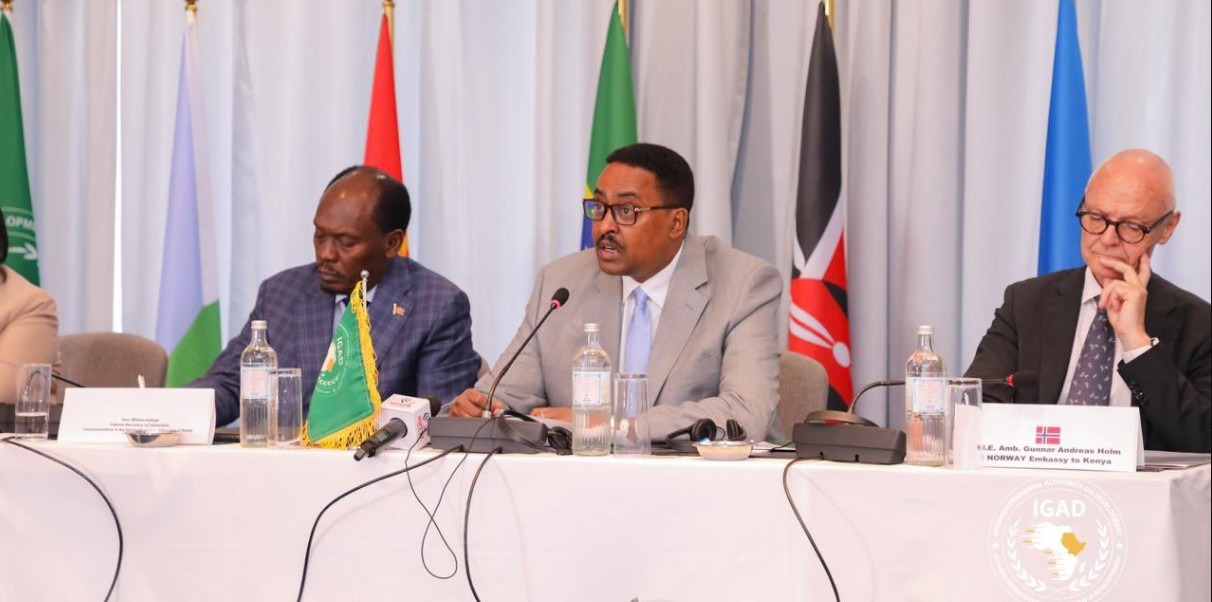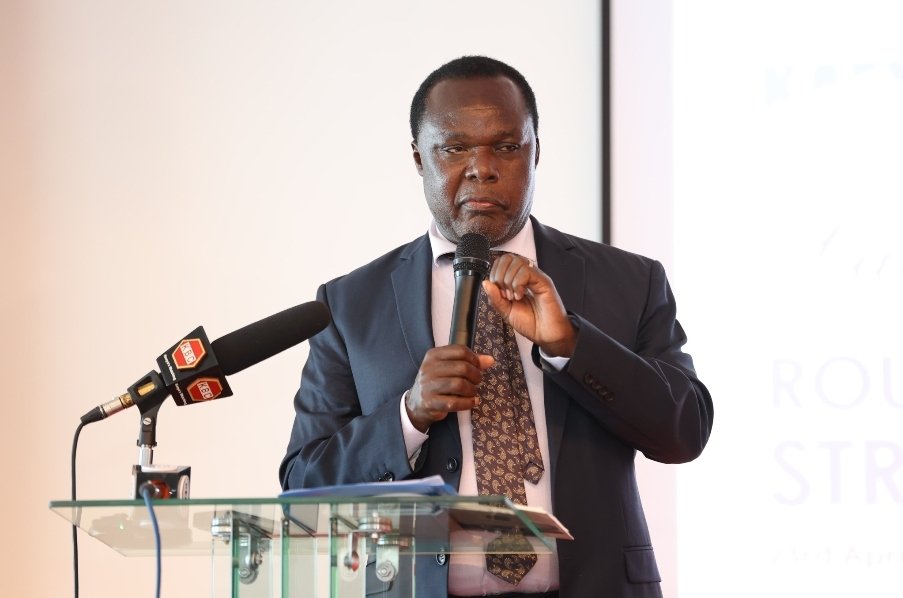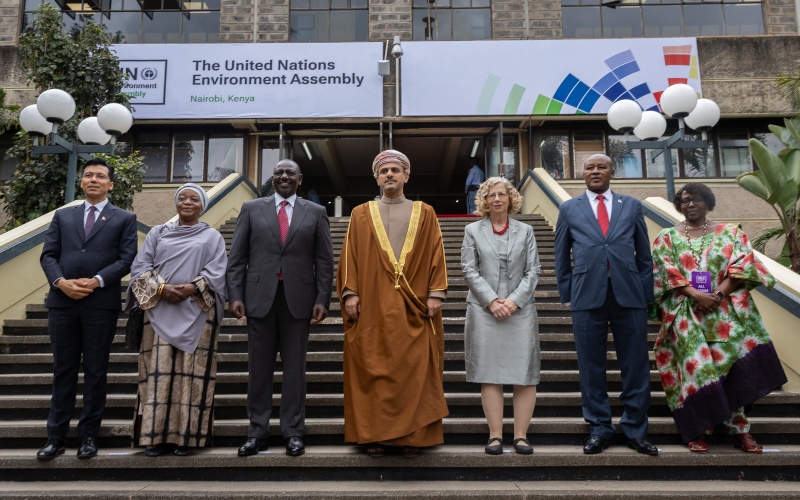IGAD calls for unified cybersecurity and AI strategy to tackle regional security challenges

IGAD Executive Secretary Workneh Gebeyehu emphasised that despite the region’s complex security threats, they also offer a chance to develop homegrown digital solutions.
The Intergovernmental Authority on Development (IGAD) has called on its member states to invest in artificial intelligence (AI) innovation as a key tool to address the region’s evolving security challenges.
Speaking during the opening of a consultative seminar in Nairobi themed "Harnessing Artificial Intelligence and Cybersecurity for Security, Cooperation and Resilience", IGAD Executive Secretary, Dr Workneh Gebeyehu, emphasised that while the region faces complex threats, they also present opportunities for homegrown digital solutions.
More To Read
- IGAD regrets Eritrea’s ‘premature’ withdrawal from regional bloc
- Eritrea withdraws from IGAD for second time, citing ‘failure to meet aspirations of the region’
- Google raises AI stakes as OpenAI struggles to stay on top
- Special forces across Africa meet in high-level Nairobi forum to counter terrorism and emerging threats
- Kenya urges stronger regional cooperation as transport corridors fuel disease risks across East Africa
- Google launches Workspace Studio, enabling anyone to build Gemini-powered AI agents
“Across our IGAD region, we face complex security challenges – from transnational crime and terrorism to cybercrime and border management gaps. I challenge us all to become active architects of our region’s digital security future,” Workneh said.
He noted that while some digital innovations are already playing a role in mitigating threats, significant gaps remain.
Security breaches
Cyberattacks, he warned, account for 68 per cent of successful security breaches across Africa, with criminal syndicates increasingly targeting law enforcement databases and terrorist groups exploiting weak digital systems.
He noted that while some digital innovations are already playing a role in mitigating threats, significant gaps remain.
Cyberattacks, he warned, account for 68 per cent of successful security breaches across Africa, with criminal syndicates increasingly targeting law enforcement databases and terrorist groups exploiting weak digital systems.
Workneh further highlighted the Horn of Africa’s potential to take the lead in deploying artificial intelligence responsibly to enhance both security and economic development.
He cited projections indicating that by 2035, AI could add up to 180 billion US dollars to the region’s GDP and create at least 2.5 million jobs.
He revealed that in 2023, Kenya alone lost over 83 million US dollars to cybercrime, with security systems facing a 45 per cent increase in attacks.
AI ethics frameworks
Workneh outlined a three-point strategy centred on coordinated governance, investments in digital skills, and indigenous innovation. He proposed the creation of unified AI ethics frameworks and shared cybersecurity protocols to allow for faster and coordinated cross-border responses to digital threats.
With projections showing a need for over 500,000 AI and cybersecurity professionals by 2030, IGAD plans to launch the Digital Security Skills Initiative. The programme will focus on training a new generation of cybersecurity experts, particularly in the law enforcement and national defence sectors.
Currently, the region produces fewer than 15,000 qualified specialists annually, a shortfall IGAD warns could compromise national and regional digital sovereignty.
To encourage homegrown tech solutions, IGAD is proposing the AI Security Innovation Fund. The fund will support local start-ups and researchers developing tools to combat terrorism, enhance border security, and improve predictive policing across the Horn of Africa.
The strategy is part of a broader push by IGAD to position the region as a leader in responsible AI governance and cybersecurity readiness.
With backing from governments, the private sector, and development partners such as Norway, the initiative seeks to transform AI from a potential risk into a regional asset.
Nairobi Commitment
One of the key proposals to emerge from the seminar was the “Nairobi Commitment", a regional pact aiming to ensure that every IGAD citizen benefits from AI-enhanced security while being shielded from digital exploitation by the end of this decade.
Under the proposed framework, member states would commit at least 2 per cent of their national budgets to AI and cybersecurity infrastructure.
The private sector would support local talent pipelines, and development partners would provide technology transfer and institutional support.
“We stand at a digital crossroads. One path leads to AI amplifying our security capabilities, where every police officer accesses real-time intelligence, every border is monitored by smart systems, and our citizens are protected by predictive security measures. The other path leads to digital colonialism, where our security data enriches distant corporations while cyber threats cripple our progress,” Workneh emphasised.
Kenya's ICT and Digital Economy Cabinet Secretary William Kabogo has warned that cyber threats facing the region are becoming increasingly transnational, sophisticated, and borderless.
“Cyber threats are increasingly sophisticated, borderless, and transnational. No single country can face them alone. Regional cooperation is no longer optional; it is urgent and necessary,” he said.
Weaponisation of AI tools
Speaking during the opening ceremony of the three-day IGAD seminar on artificial intelligence and cybersecurity in Nairobi, Kabogo said challenges such as cybercrime, misinformation, data breaches and the potential weaponisation of AI tools pose a significant risk to peace, economic stability and democratic governance.
“These are not challenges any one nation can solve alone. They require a coordinated, well-governed, and regionally integrated response,” Kabogo said.
Kabogo further stressed that a cybersecurity breach in one IGAD member state could have far-reaching cross-border consequences.
He called for the harmonisation of cybersecurity frameworks, the development of interoperable digital protocols and the establishment of trust-based systems for real-time intelligence sharing and cyber incident response.
AI governance framework
He reaffirmed Kenya’s support for IGAD’s efforts to develop a regional framework for AI governance in line with the organisation’s broader vision and mission.
Norwegian Ambassador to Kenya, Gunnar Holm, acknowledged that while technological advancements carry inherent risks, they must be addressed collectively through regional collaboration and strategic partnerships.
He noted that the seminar presents a timely opportunity to confront some of the most pressing and strategic challenges facing the world today.
“I hope this event contributes to shaping a regional vision for cybersecurity and AI governance, one that upholds human rights, promotes interoperability, and empowers institutions and communities to navigate both risks and opportunities effectively,” Ambassador Holm said.
Top Stories Today











































